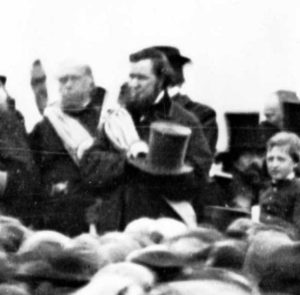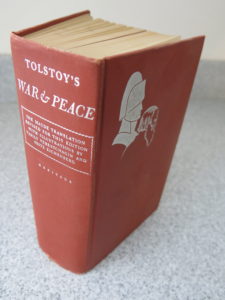 One reason is because Nobel Prizes didn’t exist then.
One reason is because Nobel Prizes didn’t exist then.
They were created by a will that Alfred Nobel signed on Nov. 27, 1895; came into being when the will was officially approved by Norwegian authorities on April 26, 1897; and weren’t awarded until 1901 (read history here). The recipient that year was French “scientific poet” Sully Prohhomme (bio here).
As an author, Lincoln is much better known than Prudhomme and many other Nobel laureates (list here), although possibly not as well known to current generations as Bob Dylan, the 2016 Nobel recipient. But notoriety doesn’t seem to carry much weight with the Prize committee, except negative notoriety may disqualify some well-known writers (e.g., Winston Churchill got it for his wartime speeches and postwar writing; Adolf Hitler didn’t get it for the more-widely-read Mein Kampf or his wildly popular — among Germans — speeches).
In fact, nobody really knows what about what the selection criteria are, but they’re likely somewhat fluid over time. Until Dylan, nobody ever got one for song lyrics, even though several more had been awarded to poets.
An unvarying criterion, though, is you have to be alive. This could go far to explain why Lincoln doesn’t get it, and likely hasn’t even been considered. The same is true of a bunch of other Nobel-worthy literati, although you’ve gotta wonder why Mark Twain and Leo Tolstoy, both alive until 1910, never got it — which leads to suspicion that selections are subject to arbitrariness.
In any case, rules are made to be changed, which Congress does all the time — so does the Norwegian Parliament — so why can’t the Nobel Prize authorities simply change that rule, or make exceptions to it? Exceptions even are made with the Ten Commandments, especially for popular politicians. (For some inexplicable reason, people who live by the Ten Commandments don’t seem to do well in politics.)
You could argue that Lincoln’s candidacy has grown stale with time, even if his Gettysburg address hasn’t, but other fields of endeavor provide ample precedent for retroactive awards to long-overlooked but deserving individuals.
(For example, Alonzo Cushing, whose Gettysburg heroism was never questioned, was finally awarded the Congressional Medal of Honor in 2014, 151 years later, despite a 5-year time limit and, apparently, an obscure requirement that there be a living relative to receive it (they rounded up a distant cousin; read about that here). And Cushing did his thing before Lincoln did his thing (by 4 months and 16 days); so, if Cushing’s claim to glory didn’t age out or grow too stale, you can’t really argue that Lincoln’s did, either.)
And if the U.S. can do that with military awards, why can’t Norway do that with Nobel Prizes?
 Maybe there’s a length requirement we don’t know about. The Gettysburg address is only 271 words, and took Lincoln only a couple minutes to read off, which isn’t very much expenditure of effort for a major literary award. “Mr. Tambourine Man,” by comparison, is 446 words, which is 64.58% longer, and presumably required that much more effort to write. On the other hand, “War and Peace” didn’t get a Nobel Prize, and it’s longer than either. (Maybe too long; e.g., the members of the Nobel committee refused to read it.) So, again, length and effort appear to be arbitrary, rather than determinative, factors — or, perhaps, aren’t considered at all.
Maybe there’s a length requirement we don’t know about. The Gettysburg address is only 271 words, and took Lincoln only a couple minutes to read off, which isn’t very much expenditure of effort for a major literary award. “Mr. Tambourine Man,” by comparison, is 446 words, which is 64.58% longer, and presumably required that much more effort to write. On the other hand, “War and Peace” didn’t get a Nobel Prize, and it’s longer than either. (Maybe too long; e.g., the members of the Nobel committee refused to read it.) So, again, length and effort appear to be arbitrary, rather than determinative, factors — or, perhaps, aren’t considered at all.
 Perhaps an author’s impact on society counts for a lot. Everybody plays and listens to “Mr. Tamborine Man.” The song is ubiquitous. Lincoln couldn’t sing. (Dylan can’t sing, either, but his fans don’t seem to care.) Of course, Lincoln was in a different business. But there are ways to measure relative success. Here, Lincoln scores lower; despite his herculean efforts to defeat secessionism, we still have secessionists — a lot of them. (Sure, the Union he sought to preserve is still holding together, for now, but it looks pretty tenuous. A current Nobel Prize committee plausibly could conclude that “Mr. Tamborine Man” will last longer than the USA will, the way things are going right now.)
Perhaps an author’s impact on society counts for a lot. Everybody plays and listens to “Mr. Tamborine Man.” The song is ubiquitous. Lincoln couldn’t sing. (Dylan can’t sing, either, but his fans don’t seem to care.) Of course, Lincoln was in a different business. But there are ways to measure relative success. Here, Lincoln scores lower; despite his herculean efforts to defeat secessionism, we still have secessionists — a lot of them. (Sure, the Union he sought to preserve is still holding together, for now, but it looks pretty tenuous. A current Nobel Prize committee plausibly could conclude that “Mr. Tamborine Man” will last longer than the USA will, the way things are going right now.)
Ultimately, though, the Nobel Prizes are administered by a bureaucracy; and bureaucracies are inflexible. They’re also as unyielding as the Gettysburg address is inspiring and uplifting. For that reason alone, if Lincoln hasn’t gotten a Nobel Prize by now, he probably never will.
Grainy images of iconic moments in American history: Above, Lincoln at Gettysburg in 1863; below, Dylan at Woodstock in 1969.
In the first decade of the prizes only Theodore Roosevelt got one. Things pick up in the 10’s with 4 and then 5 in the 20s but Einstein got his while still a German citizen. Things pick up in the 30s but for the first several decades things were definitely tilted to the European and some argue still are.
The only person to have received two Nobel’s is Madame Curie with one in Chemistry and one in physics. There are no Micheal Phelps in the Nobels, you get one in anything and you are done unless you are the magnificent Madame Curie.
Since it is supposed to be for things in the past year though clearly the Nobel committee is a bit flexible here unless Lincoln time travels or shows up off an alien space ship or his clone shows up he is out of the running. The Ice Tea and Lincoln can get together and Hip hop their way to a Nobel.